
Getty Images
Põllumajanduse tulevikku kujundavad käimasolevad teadusuuringud, innovatsioon ja suutlikkuse suurendamine põllumajanduslikus toidutööstuses, mida toetavad mitmesugused mitme finantsraamistiku algatused. Need algatused pakuvad olulist rahastamist selliste tipptasemel tehnoloogiate arendamiseks ja rakendamiseks nagu tehisintellekt, asjade internet, robootika ja digitaalsed platvormid, mis muudavad põllumajandust ning aitavad luua kestlikumat ja tõhusamat toidusüsteemi. Jätkuvate investeeringute ja koostöö kaudu saame luua helgema tuleviku põllumajandustootjatele, tarbijatele ja planeedile.
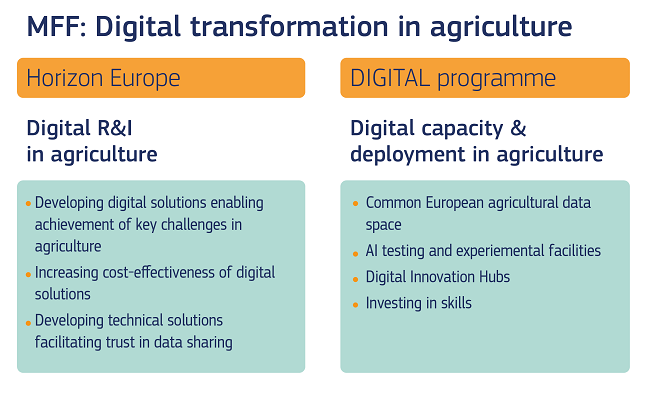
Programm „Euroopa horisont“
Euroopa Liidu teadusuuringute ja innovatsiooni raamprogrammis „Euroopahorisont“pannakse suurt rõhku jätkusuutlike ja kaasavate toidusüsteemide arendamisele teadusuuringute ja innovatsiooni kaudu põllumajandusliku toidutööstuse sektoris. Tegelikulton II samba 6. klastri raames eraldatud märkimisväärseidrahalisi vahendeid toidu, biomajanduse, loodusvarade, põllumajanduse, kalanduse, vesiviljeluse ja keskkonnaga seotud projektide toetamiseks, sealhulgas digitaalsete lahenduste kasutamiseks põllumajandussektoris.
Täpsemaltrõhutatakse 2021.–2022. aasta tööprogrammis „Toiduaine, biomajandus, loodusvarad, põllumajandus ja keskkond“ andmejagamise ja suurandmete mõju ning andmete ajakohastamise (reaalajas) andurite andmete puhul kogu ELi hõlmava tootmise ja põllumajanduse keskkonnatingimuste seireks järgmisi projekte:
ScaleAgData
ScaleAgData eesmärk on aidata kaasa Euroopa põllumajandussektori üldisele konkurentsivõimele ja jätkusuutlikkusele ning kõrgharidusalase partnerluse „Andmete põllumajandus“ ja mulla missiooni tööle.
| ScaleAgData faktid |
| Ajaskaala: 01.11.2023–31.12.2026 |
| Kogumaksumus: 7 496 557,75 EUROT |
| Teave: Veebisait, Kasutusjuhtumid, teabeleht |
CrackSense
CrackSense eesmärk on tegeleda puuviljade pragunemise probleemiga tsitrusviljades, granaatõunates, lauaviinamarjades ja magusates kirssides, arendades ja laiendades seiretehnoloogiaid, mis annavad piloottegevuse kaudu reaalajas andurite andmeid. Kogutud andurite andmed lisatakse kogu ELi hõlmavatesse andmekogumitesse, mis hõlmavad Maa seire andmeid (esitab Copernicus, nt Sentinel) ja muid keskkonnatingimusi kajastavaid andmekogumeid. Neid andmeid kasutatakse uuritud põllukultuuride põllumajandusliku tootmise jälgimiseks ning põllumajandustootjate ja kasvatajate ressursside tõhusaks haldamiseks ja tegevuse jätkusuutlikkuse tagamiseks. Parandades nende põllukultuuride põllumajanduslikku tootmist, aitab CrackSense samuti luua mudeli teiste põllumajanduskultuuride jaoks.
| CrackSense faktid |
| Ajaskaala: 01.11.2023–31.12.2026 |
| Kogumaksumus: 7 499 293,75 EUR |
| Teave: Veebisait, teabeleht |
AgriDataValue
AgriDataValue eesmärk on luua end aruka põllumajanduse ja põllumajanduse keskkonnaseire „mängumuutjana“ ning tugevdada aruka põllumajanduse suutlikkust, konkurentsivõimet ja õiglast sissetulekut, võttes kasutusele uuendusliku, intelligentse ja multitehnoloogia, täielikult hajutatud platvormid.
| AgriDataValue faktid |
| Ajaskaala: 01.11.2023–31.01.2029 |
| Kogumaksumus: 7 145 500,38 EUROT |
| Teave: Veebisait, teabeleht |
JUMALIK
Jumalik eesmärk on näidata põllumajandusandmete jagamisest saadavat kasu ja lisaväärtust. Selleks arendab komisjon välja põllumajandusandmete ökosüsteemi, mis ühendab juba ühiselt jagatud andmeid, kasutades samal ajal ka tööstusharu juhitavaid katseprojekte, mis on välja töötatud andmejagamiskavade jaoks. Tulemused toetaksid poliitikakujundajaid, tehnoloogia pakkujaid, põllumajandusettevõtete esindajaid ja muid põllumajandusandmete sidusrühmi.
Lisakskatsetatakse ja valideeritakse 4. teemavaldkond „Digitaalne, tööstus ja kosmos“ selliseid uuenduslikke tehnoloogiaid nagu asjade internet, pilvandmetöötlus ja servandmetöötlus, tehisintellekt, robootika ja plokiahel kasutamise juhtumite kaudu põllumajanduses. Kasutades kõrgtehnoloogilisi tehnoloogiaid, nagu droonid, arukad asjade internet, tehisintellekt ja reaalajas sensorite andmete suurendamine, samuti 5G- ja servalahendusi kaugpõllumajanduses, on põllumajandusliku toidutööstuse potentsiaalne kasu tohutu.
Lisaks viiakse läbi kasudevaheline analüüs ja võimalikud turu-uuringud, et tagada tegevuskava nende tehnoloogiate kasutuselevõtuks kõnealuses sektoris.
| Jumalikud faktid |
| Ajaskaala: 01.10.2022–30.09.2025 |
| Kogumaksumus: 3 954 797,50 EUROT |
| Teave: Veebisait, teabeleht |
DIGITAALNE
Programm„Digitaalne Euroopa “ (DIGITAL) pakub terviklikku lähenemisviisi innovatsiooni ja digiülemineku edendamiseks põllumajandussektoris. See hõlmab mitmeid algatusi, mille eesmärk on suurendada sektori majandus- ja keskkonnatoimet, optimeerida loodusvarade kasutamist ning aidata kaasa rohelise kokkuleppe ja ühise põllumajanduspoliitika eesmärkide saavutamisele.
Programmiüks põhiaspekte on Euroopa ühise põllumajandusandmete ruumi loomine, mis võimaldab turvalist ja vastutustundlikku andmevahetust, töötlemist ja analüüsi, et optimeerida loodusvarade kasutamist ja edendada andmepõhiseid uuendusi põllumajandussektoris. Konsortsium koondab 10 riigi uurimisinstituutide, põllumajandusandmete vahendajate ja tööstusliitude ekspertide rühma, kes teeb koostööd sidusrühmadega, et kaardistada praegune andmete jagamise maastik, analüüsida juhtimis- ja ärimudeleid ning määrata kindlaks tehniline etalonarhitektuur ELi põllumajanduse andmeruumi rakendamiseks.
| AgriDataSpace faktid |
| Ajaskaala: 01.10.2022–31.03.2024 |
| Teave: Koduleht |
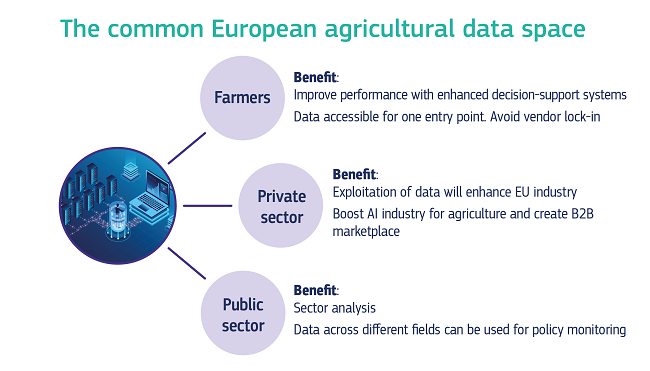 Teine oluline algatus on maailmatasemel suuremahuliste katse- ja eksperimenteerimisvahendite arendamine tehisintellekti jaoks põllumajandusliku toidutööstuse sektoris. See pakub teenuseid, mis aitavad hinnata ja valideerida kolmanda osapoole tehisintellekti ja robootika lahendusi reaalsetes tingimustes, eesmärgiga maksimeerida põllumajandussektori digiteerimise mõju.
Teine oluline algatus on maailmatasemel suuremahuliste katse- ja eksperimenteerimisvahendite arendamine tehisintellekti jaoks põllumajandusliku toidutööstuse sektoris. See pakub teenuseid, mis aitavad hinnata ja valideerida kolmanda osapoole tehisintellekti ja robootika lahendusi reaalsetes tingimustes, eesmärgiga maksimeerida põllumajandussektori digiteerimise mõju.
| AgrifoodTEF faktid |
| Teave: Koduleht |
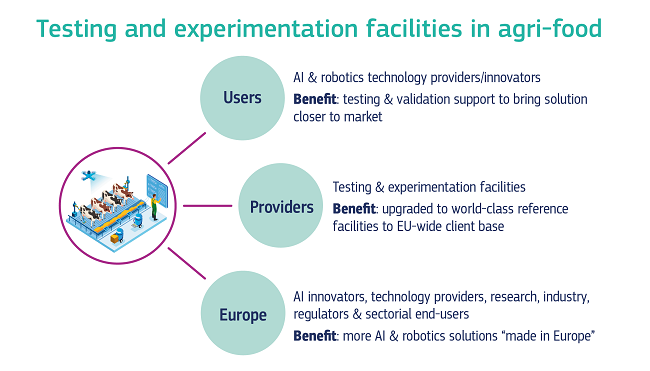 Lisaks hõlmab programm Euroopa digitaalse innovatsiooni keskuste loomist, mis pakuvad tehnoloogilist oskusteavet ja katsetamisvõimalusi, et võimaldada tööstuse ja avaliku sektori üleminekut digitehnoloogiale. Need Euroopa digitaalse innovatsiooni keskused tuginevad kogemustele ja õppetundidele, mis on saadud olemasolevatest digitaalse innovatsiooni
Lisaks hõlmab programm Euroopa digitaalse innovatsiooni keskuste loomist, mis pakuvad tehnoloogilist oskusteavet ja katsetamisvõimalusi, et võimaldada tööstuse ja avaliku sektori üleminekut digitehnoloogiale. Need Euroopa digitaalse innovatsiooni keskused tuginevad kogemustele ja õppetundidele, mis on saadud olemasolevatest digitaalse innovatsiooni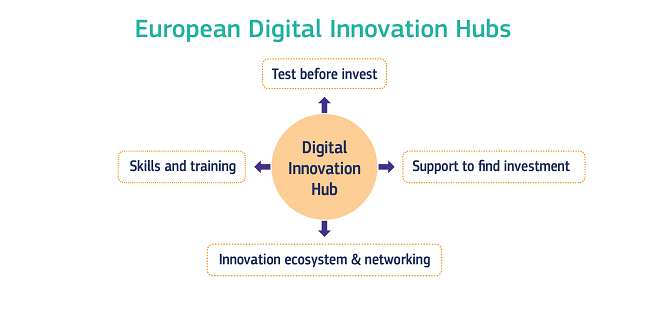 keskustest, nagu SmartAgriHubs ja AgroRobofood. Lõpuks sõltub nende algatuste edu põllumajandustootjate ja teiste põllumajandusspetsialistide digioskustest. Selleks hõlmab programm investeeringuid põllumajandustootjate digioskuste parandamisse eriharidusprogrammide või -moodulite kaudu ning toetust konkreetsete digitehnoloogiakursuste kavandamiseks ja rakendamiseks põllumajandussektori spetsialistidele.
keskustest, nagu SmartAgriHubs ja AgroRobofood. Lõpuks sõltub nende algatuste edu põllumajandustootjate ja teiste põllumajandusspetsialistide digioskustest. Selleks hõlmab programm investeeringuid põllumajandustootjate digioskuste parandamisse eriharidusprogrammide või -moodulite kaudu ning toetust konkreetsete digitehnoloogiakursuste kavandamiseks ja rakendamiseks põllumajandussektori spetsialistidele.
Kuidas võiks Euroopa pilvandmetöötluse ja servade strateegia mõjutada põllumajandussektorit?
Programmi DIGITAL raames rahastataval Euroopa pilvandmetöötluse ja servade strateegial on eeldatavasti märkimisväärne mõju põllumajandussektorile, võimaldades pilvandmetöötluse taristute ja teenuste täielikku kasutamist Euroopa ühise põllumajandusandmeruumi jaoks.
Kuidas mõjutab Euroopa andmestrateegia põllumajandussektorit?
Euroopa andmestrateegiaga luuakse andmete ühtne turg ja luuakse ühine Euroopa põllumajanduse andmeruum. Euroopa andmehaldusseadus suurendab usaldust ettevõtjatevaheliste andmete jagamise vastu, samal ajal kui andmeseaduse eesmärk on stimuleerida eraviisiliste andmete kasutamist valitsuste poolt ning lahendada andmetele juurdepääsu ja kasutamisega seotud probleeme ettevõtjatevahelistes seadetes. Taaskasutamiseks tehakse kättesaadavaks ka avaliku sektori väärtuslikud andmekogumid.
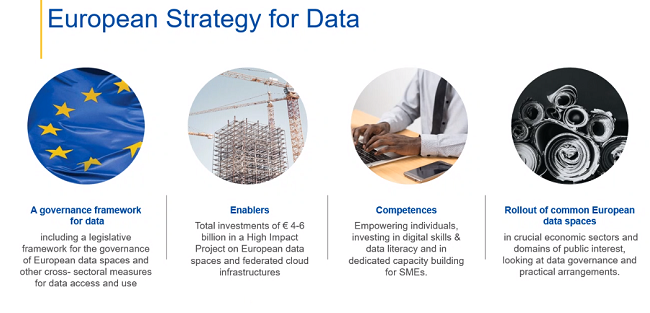 Koostöö on Euroopa edu võti
Koostöö on Euroopa edu võti
Koostöö on võti Euroopa potentsiaali vallandamiseks põllumajandusenumbrilises osas. Euroopa Komisjon on eeskujuks, tehes tihedat koostööd sidevõrkude, sisu ja tehnoloogia peadirektoraadi ning põllumajanduse ja maaelu arengu peadirektoraadi vahel. On oluline, et kõik sidusrühmad teeksid edu saavutamiseks koostööd.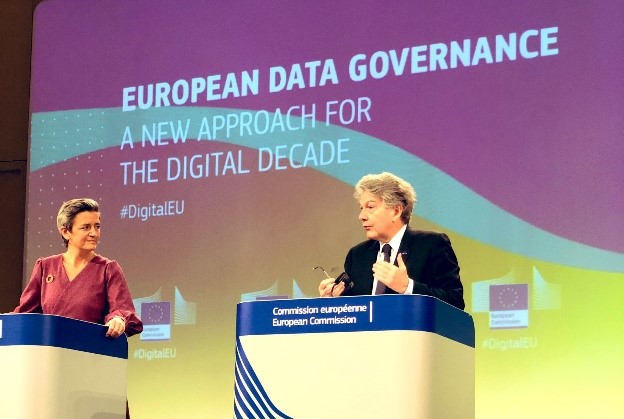
Digiüleminekust saadava kasu saavutamiseks tuleb hõlbustada teabevahetust põllumajandustootjate, põllumajandusmasinate tootjate, kooperatiivide, pestitsiidide tarnijate ning avaliku ja erasektori osalejate, näiteks digitaal- ja põllumajandusministeeriumide vahel. Koostöö ja tõhusa teabevahetuse kaudu suudame ületada probleemid ja realiseerida digitaliseerimise kogu potentsiaali põllumajanduses.
Millised on uue ühise põllumajanduspoliitika peamised eesmärgid?
Uus ühine põllumajanduspoliitika aastateks 2023–27 on üles ehitatud kümnele eesmärgile, sealhulgas valdkondadevahelisele eesmärgile, mis käsitleb numbritearvu, teadmisi ja innovatsiooni. Liikmesriigid võivad kasutada ÜPP vahendeid, et edendada digitaliseerimist põllumajanduses ja maapiirkondades.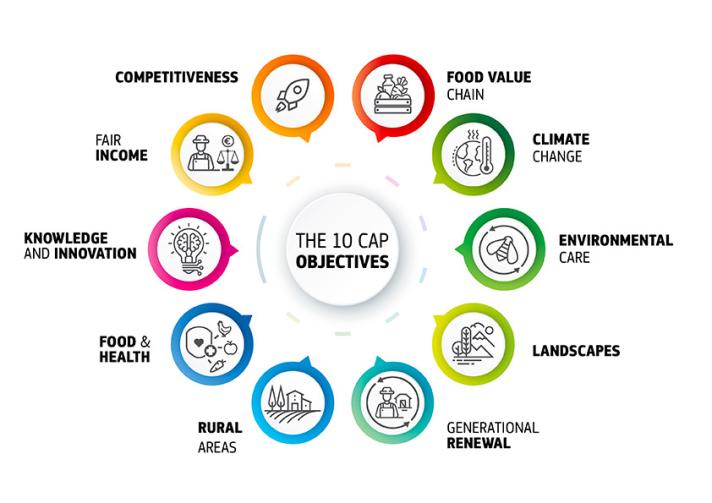
Lisateavet leiab ühise põllumajanduspoliitika kodulehelt.
Kuidas on lood strateegiaga „Talust taldrikule“?
Strateegia „Talust taldrikule“ on ELi rohelise kokkuleppe tugisammas, milles on 2030. aastaks seatud kestliku toidutootmise eesmärgid, mis nõuavad digilahendusi. IoF2020 kasutusjuhtum põllukultuuride kasvatamisel kasutas edukalt asjade interneti tehnoloogiaid, et optimeerida pestitsiidide kasutamist ja muuta põllukultuurid tarbimiseks ohutuks. Euroopa Komisjon toetab järgmise põlvkonna pilvetaristute ja -teenuste uurimist, arendamist ja kasutuselevõttu kogu ELis ning Euroopa tööstusandmete, Edge & Cloudi liidu käivitamist, et koordineerida investeerimistegevust ja tugevdada Euroopa positsiooni ülemaailmsel pilvandmetöötluse ja servandmetöötluse turul.
Lisateavet leiab strateegia „Talust taldrikule“ kodulehelt.
Seotud sisu
Üldpilt
Euroopa põllumajandussektori digitaliseerimine võib muuta tööstust revolutsiooniliseks, edendades tõhusust, jätkusuutlikkust ja konkurentsivõimet.
Vaata lisaks
On Digital Day in April 2019, 24 EU Member States and the UK signed the declaration on "A smart and sustainable digital future for European agriculture and rural areas", containing commitments for action in 3 areas:
Programmi „Horisont 2020“ kaudu eraldati teadusuuringutele ja innovatsioonile rohkem kui 200 miljonit eurot digitehnoloogia kasutuselevõtuks põllumajandussektoris.
Avasta seda saiti
Euroopa andmestrateegia
Andmestrateegia keskendub inimeste esikohale seadmisele tehnoloogia arendamisel ning Euroopa...
